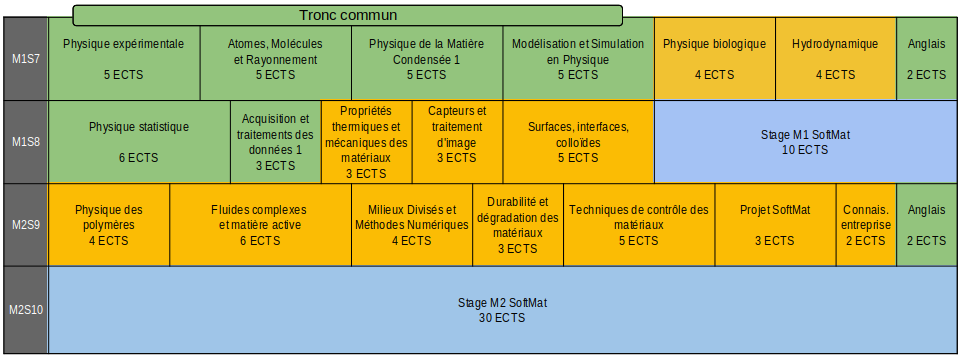ECTS
120 credits
Duration
2 years
Training structure
Faculty of Science
Language(s) of instruction
French
Presentation
Become an expert in complex and disordered matter: foams, gels, liquid crystals, glass, plastics, slurries, paints, cosmetics, food, adhesives, rubber, biological matter, etc.
Despite their diversity, these materials share common physicochemical properties such as a multiscale organization governed by weak interactions. They are likely to undergo significant reorganization under the effect of weak environmental stresses (temperature, pressure, concentration, mechanical stress, pH, electric field, etc.).
The physics involved, known as soft matter physics, is therefore intermediate between the physics of liquids and the physics of solids. The relevant size scales are mesoscopic (between nanometers and micrometers), and interfaces play a fundamental role.
This program will enable you to pursue an academic or industrial thesis with potential career opportunities in major research organizations, universities, and companies (cosmetics, food, pharmaceuticals, chemistry, etc.).
Further studies
NaN%
Objectives
The objectives of this course are as follows:
- Develop a culture of disordered matter physicist
- Acquire experimental, digital, and theoretical skills
- Put yourself in the position of leading a research project
- Opening up to physics at the interface of chemistry, mechanics, agri-food, and biology
Know-how and skills
At the end of this course, you will have acquired the following skills:
- Mastery of the physical concepts of complex matter: physics of polymers, colloids, interfaces, divided media, and biological systems.
- Conducting and analyzing experimental measurements acquired using cutting-edge techniques such as advanced microscopy (optical, electron, AFM), radiation scattering (light, X-ray), microfluidics, rheometry, and spectroscopy.
- Proficiency in analytical, numerical, and simulation tools for analyzing experimental data and interpreting it through the development of quantitative models.
- Conducting a research project (internship, supervised project), interdisciplinary dialogue, and teamwork.
Organization
Knowledge assessment
https://mcc.umontpellier.fr/ lists all teaching units (UE) and their assessment methods.
Internships, supervised projects
Internship | Mandatory |
|---|
A bibliographic project will be carried out during the first semester of M2 on a topical research theme.
Two research internships in academic or private laboratories (2 months and 6 months) will be carried out during the program.
Program
The Master's program is organized into four semesters, each of which constitutes a progressive specialization. Each semester is worth 30 ECTS credits and must be validated independently (there is no inter-semester compensation). To validate each year, the two semesters must therefore be validated separately, and to obtain the degree, both years must be validated.
The first year involves significant overlap with other Master's programs in Physics, particularly the Physics of Living Matter program. The program becomes more specialized in the second semester, and especially in the third semester, with overlap with the Master's programs in Chemistry and Mechanics at Montpellier. The fourth semester is devoted to a long internship at the end of the program.

Select a program
M1 - Physics of Complex and Disordered Matter (SoftMat)
Hydrodynamics
33hEnglish M1 PFA
2 credits21hAtoms, Molecules, and Radiation
5 credits42hExperimental physics
5 credits42hCondensed Matter Physics 1
5 credits42hBiological physics
4 credits33hModeling and Simulation in Physics
5 credits42h
Statistical physics
6 credits49,5hM1 SoftMat internship
10 creditsThermal and mechanical properties of materials
3 credits20hSurfaces, Interfaces, Colloids
5 credits42hData acquisition and processing 1
3 credits24hSensors and Image Processing
3 credits42h
M2 - Physics of Complex and Disordered Matter (SoftMat)
Durability-aging of materials
3 credits20hPolymer Physics
4 credits24hSoftMat Project
4 creditsEnglish M2 PFA
2 credits21hKnowledge of the company
2 credits16hDivided Environments
4 credits42hMaterial testing techniques
5 credits33hComplex fluids and active matter
6 credits36h
M2 SoftMat internship
30 credits
Admission
Registration procedures
Applications can be submitted on the following platforms:
French & European students:
- For the M1, follow the "My Master's Degree" procedure on the website:https://www.monmaster.gouv.fr/
- For M2 students, applicants must submit their application via the e-candidat application:https://candidature.umontpellier.fr/candidature
International students from outside the EU: For the M1, follow the "Études en France" procedure: https://pastel.diplomatie.gouv.fr/etudesenfrance/dyn/public/authentification/login.html
Target audience
Students wishing to obtain training to pursue academic or private research.
Welcoming Erasmus students and Campus France.
Mandatory prerequisites
Bachelor's degree in Physics or Bachelor's degree in Physics and Chemistry
Recommended prerequisites
None
And after
Continuing education
Doctorate
Gateways and reorientation
As the first year of the Master's program has many modules shared with the other tracks of the Master's in Fundamental Physics and Applications, it will be possible to switch between the different tracks.
Professional integration
Major research organizations, universities, and companies (cosmetics, food, pharmaceuticals, chemicals, etc.).
As this is a new Master's degree program in Physics, no data is available at this time.


